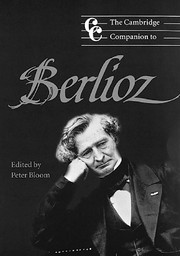Book contents
- Frontmatter
- Introduction: Berlioz on the eve of the bicentenary
- Part I Perspectives
- Part II Principal compositions
- Part III Major writings
- 9 The Mémoires
- 10 The short stories
- 11 The criticism
- 12 The Grand Traité d'instrumentation
- Part IV Execution
- Part V Critical encounters
- Part VI Renown
- Notes
- Bibliography
- Index
11 - The criticism
from Part III - Major writings
Published online by Cambridge University Press: 28 September 2011
- Frontmatter
- Introduction: Berlioz on the eve of the bicentenary
- Part I Perspectives
- Part II Principal compositions
- Part III Major writings
- 9 The Mémoires
- 10 The short stories
- 11 The criticism
- 12 The Grand Traité d'instrumentation
- Part IV Execution
- Part V Critical encounters
- Part VI Renown
- Notes
- Bibliography
- Index
Summary
For Berlioz, music journalism was a double-edged sword: a financial necessity and a burden, on the one hand; an opportunity to make his views heard and to change public taste, on the other. During nearly four decades of activity as a music critic he left over nine hundred journalistic items ranging from opera and concert reviews to stories, discussions of aesthetics, and technical articles on conducting, organology, and pitch. Musical insight and literary flair combined to produce a body of criticism unparalleled in its richness but tinged, for the modern reader, with the regret that in writing so much journalism Berlioz necessarily wrote less music. Yet in using criticism to justify his art, Berlioz was at the forefront of a nineteenth-century tradition presaged by E. T. A. Hoffmann and continued by both Schumann and Wagner – a tradition of educative and even propagandistic writing (at its Wagnerian extreme) that acknowledged and attempted to close the gap between avant-garde composition and a predominantly bourgeois public with considerable purchasing power but conservative taste.
The peril of such didactic writing lay in the critic's duty to denounce what he saw as artistically suspect, which in Berlioz's case meant the music of contemporaries almost all of whom were more commercially successful than he. As a critic of integrity, Berlioz had little option but to allow his readership to know, or at least to glean, his own points of view; as a composer in need of support from more established figures at the Opéra, Conservatoire, and Académie des Beaux-Arts, he could ill afford to be perceived as a petulant spoiler of reputations.
- Type
- Chapter
- Information
- The Cambridge Companion to Berlioz , pp. 157 - 163Publisher: Cambridge University PressPrint publication year: 2000
- 2
- Cited by

